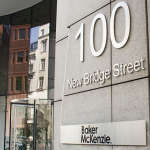In a bid to keep pace with high-paying US rivals, Clifford Chance (CC) has voted through another round of changes to its remuneration, introducing more flexibility to pay top billers.
Following a partnership vote which closed last week, the firm’s management has been handed ‘more flexibility’ to hike compensation for top earners, amid expectations that a select few could be handed deals worth 150 points, enough to push earnings over £2m.
However, the terms of the changes remain unclear, despite reports internally and externally that CC is prepared to either offer 150-point deals – 50% over its core City plateau – or 130-point deals topped up with additional bonuses.
The move would go further than the partnership shake-up that CC voted on in 2015, which overhauled its core equity point range from 40 to 100 to allow top performers to earn 115 or even 130 points. That shake-up also sanctioned a discretionary gate at 70 points aimed primarily at the City giant’s European offices. It is unclear if plateau earnings in major foreign offices are impacted by the latest shake-up, though one current partner cited the possibility of rainmakers on the Continent earning 80-100 points.
One CC partner commented: ‘Last week, people voted mainly on a principle. Nobody knows yet the number of points they will be allocated precisely – this is for management to decide. People voted for the detail without knowing where they will sit.’
‘The higher you go, the more points you get, but these will be scarcely available. It would be misleading to compare it to the previous system. The higher end is much higher, as the value of one unit went up. The whole matter has been rewritten and there is a higher level, much more complex approach to it all.’
The 2015 shake-up was designed to dramatically hike profit-per-point, from around £13,000 then to an ultimate target of £20,000 by removing points in circulation, while increasing scope to pay top performers who were being targeted by more profitable US law firms.
According to several partners, CC has so far been extremely slow to award super plateau deals, though a substantial number of partners have already been moved down the lockstep in foreign offices.
Some believe that the latest shake-up is related to the widening gap in partner remuneration between London leaders and US firms investing heavily in the City in the wake of last year’s Brexit vote, which has sent sterling plunging.
One external source cited a drive at CC to ultimately pay its best partners £3m-plus through a combination of super-point deals and hiking the underlying value of points, adding: ‘It’s very ad hoc. They are not transparent. They are trying to pick off key people and get them tied in.’
CC’s move comes as all three of its big four City rivals have pushed through reforms to boost pay flexibility and fend off predatory US rivals. Last November, Linklaters partners voted to accept changes to the firm’s lockstep, that will provide more flexibility in moving partners on the ladder. The changes followed a review of the firm’s lockstep by managing partner Gideon Moore.
Earlier this year, Allen & Overy also confirmed it broke lockstep again for a New York finance team hired in February from Paul Hastings, six months after it also went off-lockstep to recruit a US leveraged finance team from White & Case.
With a lull in transactional activity in Europe and a major cloud hanging over the City thanks to the ongoing Brexit talks and the upcoming general election, there will be some doubts as to whether this is enough to shore up the London elite.
CC declined to comment.
georgiana.tudor@legalease.co.uk












